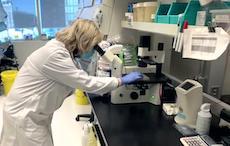Episode Description
Chemotherapy works by essentially poisoning cancer cells, which grow more quickly than most normal cells, and thus absorb a lot of the toxic drugs. It has been regarded as a standard treatment in cancer care for decades, and can work wonders, especially early in a person's treatment. But over time, these drugs may stop working. Dr. Catherine O'Brien and her team at the Princess Margaret Cancer Centre were trying to figure out how cancer cells apparently become resistant to chemotherapy when they made the discovery that the cells can enter a state akin to hibernation to avoid the toxic onslaught of the drugs.
In this episode of the Behind the Breakthrough, Dr O'Brien discusses how her team made this groundbreaking discovery and how it may lead to unique therapeutic opportunities for patients in the future. She also discusses the importance of making connections between different scientific disciplines, and how a Grade 10 career day spent with a female surgeon inspired her to pursue a career in surgery herself.
About Dr. Catherine O'Brien

Catherine O'Brien is a Senior Scientist at the Princess Margaret Cancer Centre, a General Surgeon at UHN, and an Associate Professor in the Department of Surgery at the University of Toronto. She also holds the Canada Research Chair in Translational Research in Colorectal Cancer.
Dr. O'Brien obtained her MD from Queen's University and completed a General Surgery residency at the University of Western Ontario. She subsequently completed a fellowship in surgical oncology at the University of Toronto, specializing in gastrointestinal malignancies. She also completed a Ph.D. at the University of Toronto studying cancer stem cells in colorectal cancer during her fellowship.
The focus of Dr. O'Brien's lab is to identify the molecular pathways responsible for driving tumour growth in colorectal cancer, with the ultimate goal being to use this knowledge to come up with better treatment options for patients.
Want to learn more about Dr. O'Brien and her work?
Produced By: Maria Madden |
Host: Christian Cote |
Audio Editing and Mixing: 217 Audio
